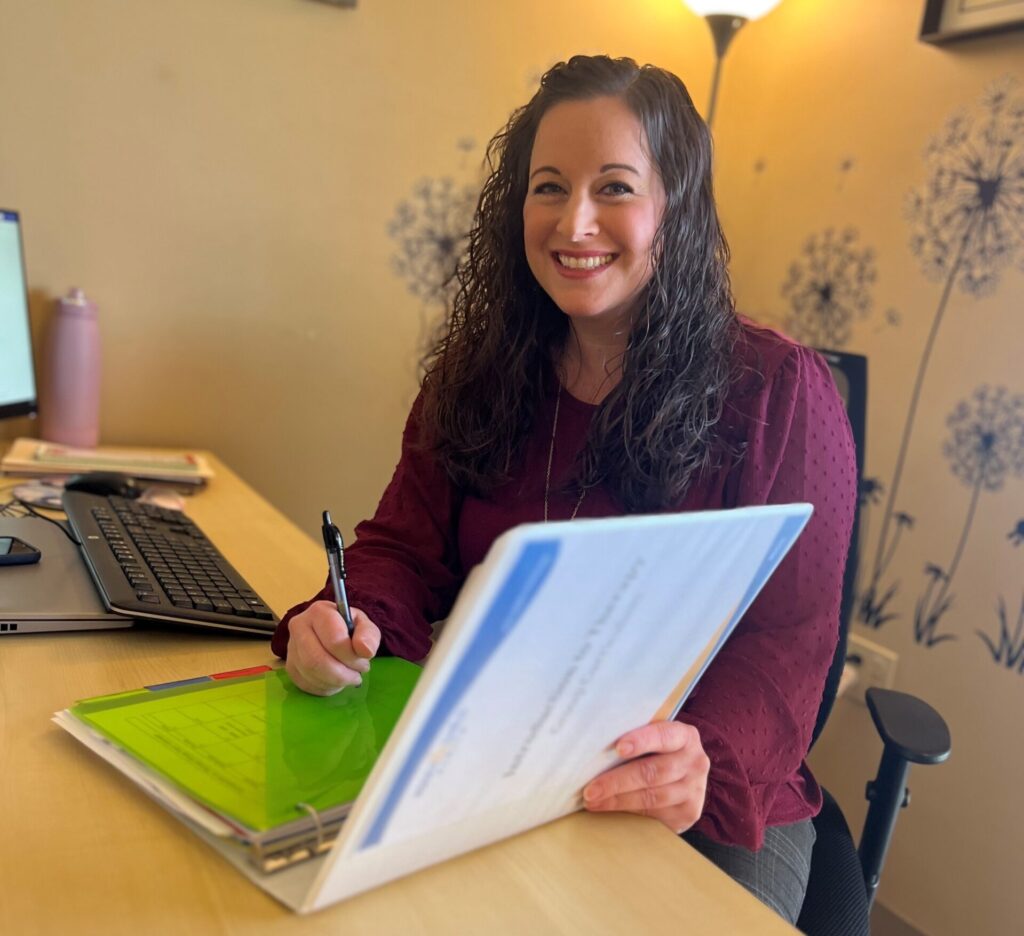CREATIVE PROBLEM-SOLVING RESULTS IN INTRO TO THERAPY GROUPS
A&C is now connecting its clients with a therapist more quickly after their initial intake.
“We have increased access to care in a big way,” said Michelle Kalogeros, Lead Access Clinician (pictured).
The need for mental health resources and treatment has risen significantly in the United States in the years following the onset of the Covid-19 pandemic. According to the 2022 “Community Mental Health Needs Assessment Report for Marion County,” an estimated 66% of Marion County residents who needed treatment for serious mental illness did not receive it.

“A conversation started with the safety and the ethical issues with seeing a client with mental health needs—maybe a client who is presenting at risk, having thoughts of wanting to harm themselves or severe depression—then having them wait six to eight weeks for an individual therapy session,” Michelle said.
Having been an intake clinician for three years, Michelle also saw some of her peers wanting to grow professionally. Looking at the massive numbers of intakes being completed, a shortage of available appointment slots with outpatient therapists, and a fully-staffed intake team that is trained in therapy, she thought to herself— “How can we repurpose our staff to do both?”
CBT: Cognitive Behavioral Therapy
CBT is a form of psychological treatment that involves learning better ways of coping with psychological problems, which can relieve symptoms and help individuals become more effective in their lives. Strategies may include using problem-solving skills to cope with difficult situations, facing one’s fears instead of avoiding them, and learning to calm one’s mind and relax one’s body.
Source: The American Psychological Association, APA.org
In May of 2022, Michelle assembled a curriculum and created a proposal for Intro to Therapy, a short-term group led by intake clinicians that would offer basic CBT concepts to help patients with grounding techniques and to help prepare them for individual therapy. She took the proposal to her supervisor, Laura Barrett, Director of Behavioral Health Services.
“She was a big advocate; she helped me feel really empowered to get started and just jump in,” Michelle said.
Michelle’s next step was to meet with the rest of the intake clinicians to explain what was being created and to ask if anyone would be interested in leading a group. Four clinicians— Natalie Raab, Kate Curtis, Courtney Markland, and Tonya Small— stepped up to join Michelle in leading group therapy.
This team then developed a schedule that would allow a new group to kick off each week: five groups at different locations and different times with staggering start dates. This involved extensive behind-the-scenes work to determine which rooms would be available with the appropriate capacity, then to adjust the staff’s intake schedules accordingly to allow them to lead the group and complete the documentation and case management that went along with it.
Michelle and the team ensured that all loose ends were tied; everything from determining how to assess risk and how to ask for assistance when it is needed, to creating a risk diary card and informational handouts, all the way down to making signs for doors that said “group in progress.”
“There were lots of details and lots of things involved in creating the group other than just creating the curriculum, but it all came together pretty beautifully in a short amount of time,” Michelle said. “After the creation, it was a really big group effort to figure out what was working and what needed improvement. Group leaders really came together well to figure out what worked and how we could better it.”
PARTNERS IN HEALTH: INTRODUCING CLIENTS TO INTRO TO THERAPY
Group therapy may not be the first thing that comes to clients’ minds when they picture their road to healing. Fortunately, there was extensive thought and care put into this new program— including how to authentically encourage clients to feel comfortable and engaged.
“First and foremost,” Michelle emphasized, “we want you to be safe. We want you to have a therapist that you can check in with until we have a therapist available for your individual therapy.” Intro to Therapy group puts clients in front of a therapist weekly. If the client is at risk, they’re able to meet with the therapist one-on-one after group.
This is where the risk diary cards come in. A physical diary card is printed out and set in front of each client as they arrive for group. Each client can document their impression of their current status and place the card face down. After collecting the cards, the therapist determines whether anyone is presenting with risk and then holds those clients at the end to individually assess and complete a safety plan if needed.
The second important aspect of Intro to Therapy is that it helps clients determine their own goals and work toward meeting them in therapy. “This information can be helpful in understanding what you can learn in therapy and how you can be successful,” she said. “If they would say ‘well, I’ve already been in therapy,’ then I would say ‘Great! Then you’ll be an expert and a great encourager for the group.’”
WHAT IS AN OPEN ACCESS INTAKE CLINICIAN?
Intake Clinicians complete comprehensive diagnostic intakes. This involves information gathering through client report and record review, risk assessment, clinical documentation, diagnosis, writing a treatment plan, and determine which treatment team can best meet a client’s needs. They then refer clients for appropriate behavioral health services within the organization – to outpatient therapy, outpatient addictions, school-based services, or community-based services. Internal referrals can also include psychiatric medication management. This position requires a master’s degree and an associate’s license.
HOW DOES OPEN ACCESS WORK?
Each Access client is scheduled with an intake clinician for an hour-long, face to face appointment. This is followed by roughly an hour for the clinician to write up the comprehensive intake.
Intake clinicians work with a clinically licensed Team Leader as well as a psychologist who can help support intake clinicians with clinical diagnosis and client treatment recommendations.
The final crucial piece for the program’s success is client engagement. “We want you to know that it’s important to go to therapy to make progress on your goals. So, attending and completing group lets us know that you’re committed to your treatment,” said Michelle.
INTRO TO THERAPY GROWS & SUCCEEDS
The groups, which began accepting clients in June of 2022—not even two full months after Michelle began her proposal—went so well that they were later able to add virtual sessions. Then in January of 2023, they expanded the program further to offer adolescent groups for individuals ages 13 to 18 years old.
That January brought another big change to the program, when Michelle was promoted to Team Leader for Integrated Health Home. She recommended Kate Curtis, one of the current group leaders, to take over coordinating the group.
Kate has continued to see clients finding success in Intro to Therapy, with 62 to 73% of clients completing the four-week program. She also noted another benefit of the group is that unless approved for urgent medications, patients typically must go through three to four appointments before being prescribed. Intro to Therapy sessions count as appointments, which allows them to get started sooner once connected with their individual therapist.
From a provider perspective, Intro to Therapy is an excellent indicator of engagement. It reinforces the importance of showing up for therapy, encourages active participation, and results in high-demand appointments being utilized by clients who have a proven record of attendance. If Intro to Therapy clients aren’t engaging—if they don’t attend at least three of the four group sessions—those individual therapy appointments can remain available for other clients who need them.
Fortunately, clients who complete Intro to Therapy have shared resoundingly positive feedback. Major takeaways include knowing that they are “not alone with [their] feelings,” that their “feelings are valid,” and that “there’s a lot of resources that will help [them] manage [their] symptoms.” One client noted that they went from dreading their group appointment each week to looking forward to it, and another said that they wished it could go on longer than four weeks.
Ultimately, the big win is that clients are now connected with a therapist one to two weeks from their initial intake, increasing their access to care and improving health outcomes. Clients are able to begin individual therapy sooner, equipped with knowledge and expectations to set them up for more productive healing and hope.
At Adult & Child Health, we know that our staff have deep and compassionate insights on client care that can be used to impact positive change— that’s why we pride ourselves on empowering employees and giving them the tools needed to serve our communities better each and every day.
Interested in joining a team of problem-solvers and change-makers? View open positions and apply today.







